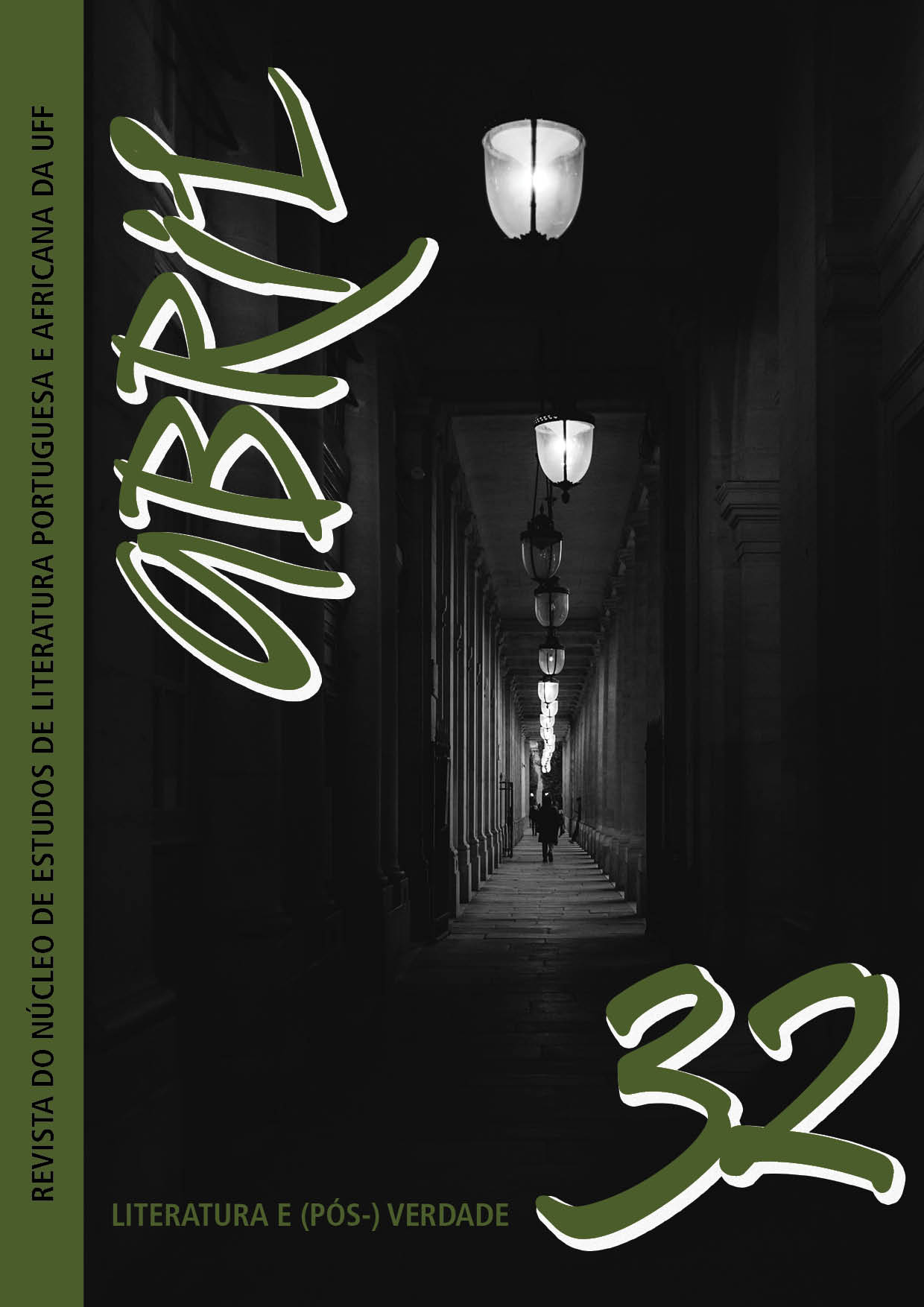A “A mass grave of deceased flowers”: visions and revolutions of the 25th of April in Fado Alexandrino and the Inquisitors’ Manual by António Lobo Antunes
DOI:
https://doi.org/10.22409/abriluff.v16i32.61908Keywords:
Carnation Revolution, António Lobo Antunes, carnivalization of history, hyperboleAbstract
The episode of the Carnation Revolution runs through António Lobo Antunes’ work from beginning to end, and is one of the most significant examples of the narrative’s use of the “carnivalization of history” (Bakhtin). The fictional representation of this event is marked by the disruption of social hierarchies in the diegetic universe, as well as the narrative focus on the intimate sphere of the characters, among other phenomena. In Fado Alexandrino (1983), alongside the detailed description of the 1974 popular uprising made by the former colonial war soldier, the novel presents an apocalyptic vision of the last day of the Estado Novo. Similarly, in The Inquisitors’ Manual (1996), the Carnation Revolution is mainly treated from an intimate perspective, in which the fall of the regime materialises in the destruction of the domestic universe of the minister’s farm in Palmela. Lobo Antunes constructs a multifaceted image of that “time of the rupture of ruptures” (as Eduardo Lourenço called the 1974 coup), with the aim of highlighting the various revolutions that the Carnation Revolution brought about on an individual and collective level. By resorting to hyperbole and desmystifying history, Lobo Antunes wants to point out the relativisation of the official discourse on this event.
Downloads
References
ANTUNES, António Lobo. Conhecimento do Inferno. Alfragide: Dom Quixote, 2004. Edição Ne Varietur.
ANTUNES, António Lobo. O Manual dos Inquisidores. Alfragide: Dom Quixote, 2005. Edição Ne Varietur.
ANTUNES, António Lobo. Fado Alexandrino. Alfragide: Dom Quixote, 2007. Edição Ne Varietur.
ARNAUT, Ana Paula. A escrita insatisfeita e inquieta(nte) de António Lobo Antunes. In: CAMMAERT, Felipe (org.). António Lobo Antunes: a arte do romance. Alfragide: Texto, 2011, p. 71-88.
BESSE, Maria Graciete. La question de l’Histoire dans le roman portugais contemporain. Cahiers du centre interdisciplinaire de méthodologie — Histoire et Littérature, (1), n. 4: Université Michel de Montaigne-Bordeaux, p. 93-119, 2001.
BLANCO, María Luisa. Conversaciones con António Lobo Antunes. Madrid: Siruela, 2001.
BOUJU, Emmanuel. Désillusions lusitaniennes: du récit de l’histoire au murmure confessionnel (chez Lídia Jorge et António Lobo Antunes). In: PEYRACHE-LEBORGNE, Dominique; COUÉGNAS, Daniel (dir.): Le Roman historique. Récit et Histoire. Nantes: Éditions Pleins Feux, 2000, p. 226-247.
CAMMAERT, Felipe. ‘Souvenir from Lisbon’: escrita, representação e punctum em António Lobo Antunes. Santa Barbara Portuguese Studies: António Lobo Antunes, nº 6, p. 18-28, 2021. Disponível em: https://sbps.spanport.ucsb.edu/volume/6 . Acesso em 09/04/2024.
CAMMAERT, Felipe. Elementos para uma poética do(s) naturalismo(s) na obra de António Lobo Antunes”. In BASÍLIO, Kelly Benoudis; CAMMAERT, Felipe (ed.). Naturalismos. De Lucrécio a Lobo Antunes. Lisboa: Húmus, 2012, p. 156-169.
CAMMAERT, Felipe. O relógio avariado: sobre algumas representações do ‘tempo da memória’ na obra de António Lobo Antunes e na arte contemporânea. In: ALVES, Fernanda Mota et al (org.). Filologia, Memória e Esquecimento. Lisboa: Húmus, 2011, p. 239-258.
CAMMAERT, Felipe. ‘You don’t invent anything’: memory and the patterns of fiction in Lobo Antunes’ works. Portuguese Literary & Cultural Studies, 19/20, 2011b, p. 267-289. Disponível em: https://ojs.lib.umassd.edu/index.php/plcs/article/view/PLCS19_20_Cammaert_page267/1032 . Acesso em 09/04/2024.
CAMMAERT, Felipe. L’écriture de la mémoire dans l’oeuvre d’António Lobo Antunes et de Claude Simon. Paris: L’Harmattan, 2009.
GIL, Ana Cristina. António Lobo Antunes: a anti-épica e a identidade nacional. La Lusophonie: voies/voix océaniques. Lisboa: Lidel, 2000, p. 114-120.
GIUDICELLI, Michelle. As Naus d’António Lobo Antunes et la carnavalisation de l’histoire officielle. La Littérature portugaise: regards sur deux fins de siècle (XIXe-XXe). Bordeaux: Maison des Pays Ibériques, 1996, p. 29-41.
MOURA, Jean Marc. Le voyage marin à l’âge post-moderne: éléments de réflexion sur une altérité désormais impossible. In: MAGALHÃES, Isabel Allegro de et al. (dir.). Literatura e Pluralidade Cultural. Lisboa: Colibri, 2000, p. 797-810.
SEIXO, Maria Alzira. Os Romances de António Lobo Antunes. Alfragide: Dom Quixote, 2002.
SEIXO, Maria Alzira et al. Dicionário da Obra de António Lobo Antunes. Lisboa: INCM, Vol. II, 2008.
SEIXO, Maria Alzira. As flores do inferno e jardins suspensos. Alfragide: Dom Quixote, 2010.
SIMON, Claude. L’Herbe (1958). Paris: Minuit, 1986.
Downloads
Published
How to Cite
Issue
Section
License
Copyright (c) 2024 ABRIL – NEPA / UFF

This work is licensed under a Creative Commons Attribution-NonCommercial 4.0 International License.
I authorize the journal Abril - NEPA/UFF to publish the paper of my authorship/responsibility that I now submit, in case it is accepted for online publication.
Moreover, I declare that this contribution is original, that it was not submitted to any other editor for publication, and I sign the present declaration attesting the truth of all its contents.
The copyright of the works published at the virtual space of the journal Abril - NEPA/UFF are automatically entitled to the journal. Their total or partial reproduction is conditioned to the authors' citations and publication data.

Abril is licensed under a Creative Commons - Attribution-NonCommercial 4.0 International (CC BY-NC 4.0).









